If you are running a travel and hospitality business (or planning to do so) you need to conduct a travel market research if you want to be successful in it.
A few decades ago only the largest industry players could afford a thorough tourism market research, but now you can do it by yourself!
We’ve got Internet in the meantime and we will show you how you can do a decent travel market research on your own with available and FREE TOOLS that can be found online.
Most of your competitors probably didn’t do any of this so this is your chance to take an advantage!
Most important, you will make your further business investments and marketing efforts more successful.
Travel Market Research – Why It Matters?
The tourist market has certain specifics that distinguish it from other industries: Demand is moving towards supply; demand is elastic and very changeable while supply can’t change and adapt enough to fast changing needs.
Also, some of the basic characteristics of tourist market are variability, turbulence and instability.
Therefore, the research needs to be done more often than in other industries, because sometimes the market situation changes day by day.
It was not so easy to conduct a travel market research before. We have no experience with these earlier systems, but we can only imagine how much it was difficult for a small travel agent or independent hotelier to conduct a research of supply and demand for a particular travel deal two decades ago.
Today, however, thanks to the Internet, it is much easier for us to get more precise data.
In this post, we will take travel agent that sells its arrangements on tourism market as an example.
Having enough market insights for certain travel packages will give the travel agent useful info about the competition, suppliers, and demand quantity.
This data can be used for setting up prices, allocating marketing resources (focusing more money on in-demand packages), introducing new packages (if demand growth for a new destination is noticed) or removing certain destination from the offer (if the demand is decreasing and the competition is higher).
How To Do a Basic Tourism Market Research – Step by Step
Let’s say that we have several travel deals for Prague in our travel agency and we need to know the level of demand for this destination, how many different Prague packages are offered on the market, what are their prices and conditions, and what are these arrangements like when compared to ours.
For market research, we will use the following tools:
- Google Search
- Google Keyword Planner
- Google Trends
- Facebook Search
- Twitter Search
1. Google search
We can use Google search to get familiar with our competition, overall offer, market prices and many other things. We will enter the following queries in the search bar:
- Prague trip
- Prague travel deals
- Prague trips
- Prague arrangement
- Prague travel package
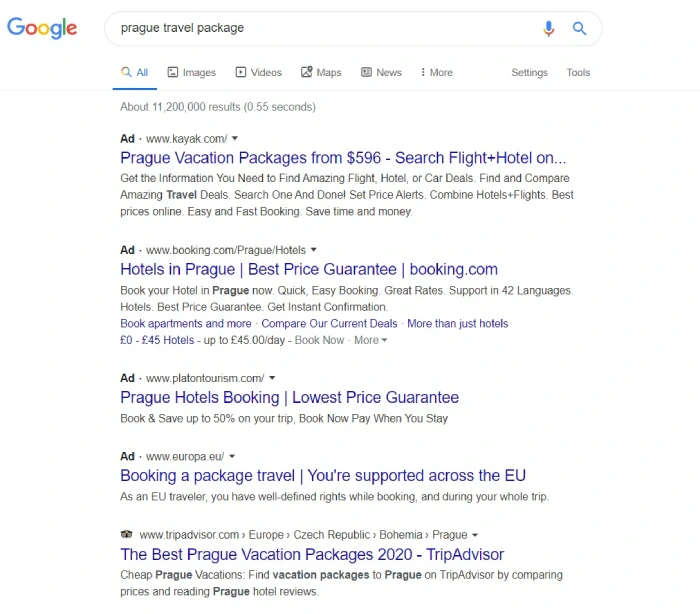
From the search results pages we can see many things – how many travel agents on the market offer travel deals for Prague, what are these packages like, what are the conditions, whether there are some special offers and discounts, etc.
Also, we can visit their websites and see how serious they are in their online appearance, how quality their website is, get content and marketing ideas, and see whether we can get ahead of them in search results (with the appropriate tourism SEO).
We can also see how many travel agents are using paid advertising on Google for these keywords with Google Ads. To read more about how you can use Google Ads in travel check out this blog post.
It is important to use advanced filters and tools and combine it with ordinary search results. We can check the images page (where we can see how the existing promotional visual content looks like) or see just results in the past year.
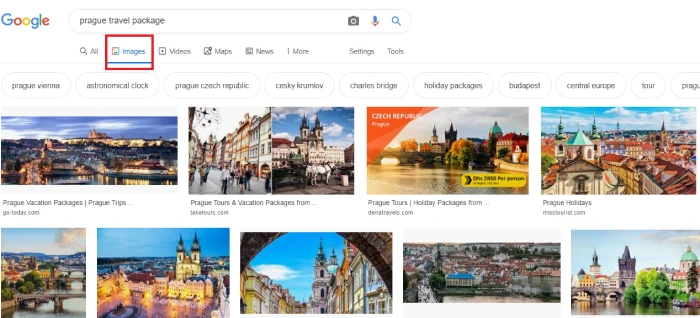
If there are many travel deals for Prague in the search results at that particular moment, with many agents competing in paid ads, we know that the offer for this destination is pretty good and that we need to offer a deal that significantly ‘’stands out from the crowd’’ if we want to be competitive (lower price, additional trip, thematic experience, etc.).
IMPORTANT NOTE: Use AdPreview and Diagnosis Tool!
In order to get the most accurate data in your search results, you must use the mentioned tool within Google Ads, in the Tools section.
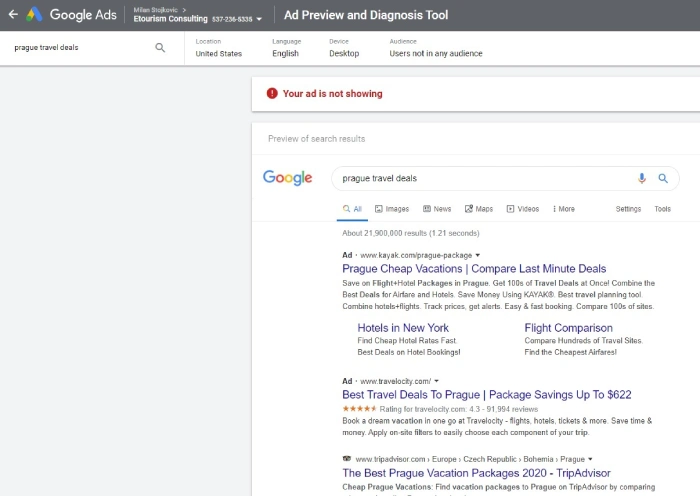
If you would just go to Google and search for Prague travel deals, you would not get the correct search results on the market, but the results customized for you.
Google adapts search results to all of us and does so based on the location we are in, previous search and traffic history, the habits we have on the internet, and so on. However, when we use the Ad Preview and Diagnosis Tool we will only get pure and neutral search results, without any adjustment to us.
Make sure to enter your desired Country and Language when using Ad Preview and Diagnosis Tool.
2. Google Keyword Planner
This tool is a next step after the basic Google research.
Google Keyword Planner is available under your Google Ads account. It’s free but make sure that you had several active campaigns in order to get more precise data in Keyword Planner.
Keyword Planner provides us with an insight into the scope of demand for a particular travel deal.
With this tool, we can see how many times travelers search for specific keywords on a specific territory (for example, how many times in a month the phrase “Prague deals” is searched for on Google in the United Kingdom).
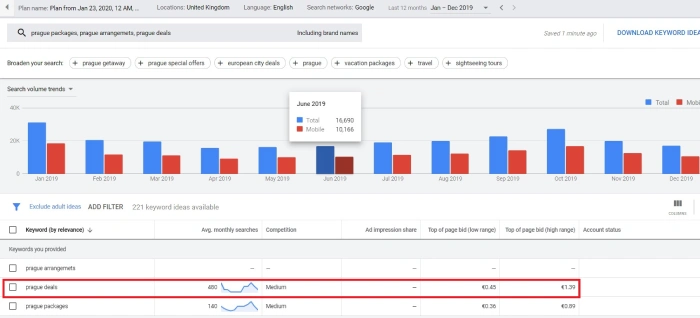
We can also see what is an expected CPC – Cost Per Click for those keyword so we can plan our budget if we plan to run Google Ads.
Based on keyword entries, we can also get new ideas and discover new keywords that may be important for us.
If the keyword “Prague travel deals” has a higher search volume than the “Berlin travel deals”, it means that there is a higher demand for Prague as a destination on the market.
Note: never enter only the destination name if it is not the tourist resort exclusively. Prague, Vienna, Paris are not just tourist destinations, and if you enter only the names of these cities, you will get information that does not mean anything to you (many expats are searching for something in Vienna, and of course they are not interested in your travel deals). Always enter destination name and the words like travel or travel deal next to it.
Similarly, if we see that there is a high competition for a given keyword it means that there are many tour operators selling the same destination at the market and already running Google Ads.
This means that it will take more effort and money for our travel deal to be placed on the first result page. However, using the insights from the Keyword planner we can calculate our advertising costs and see if we can afford it.
This is a much smarter way to do it, than just place some campaigns, spend money and see how it goes.
In our example, as you can see in the picture above the word “Prague deals”, in the United States, on average, has only 480 monthly searches.
We can also see that the competition for this keyword is high, which means that a large number of agencies are running ads and bidding on this keyword. We can also see the approximate price per click that we would have to pay if we want to enter the race.
On average, you can expect 1% conversion rate from the Google ads visitors.
That means if we set the Google Ads campaign for a keyword that costs $1.30 per click, we’ll pay $130 for 100 website visitors, and out of those 100 visitors who come to our website, we can expect 1 booking. If it’s worth paying 130 dollars for one travel deal sold then this is a good opportunity for advertising. Otherwise, you should reconsider using Google Ads as a possible advertising channel, or find some other techniques, like remarketing, Google display ads or RLSA campaigns.
Tour operators and hoteliers often make a mistake here and just place the campaigns without prior travel market research for the particular keywords.
No wonder the budget get wasted.
But if you do this small research you can save yourself from running unsuccessful campaigns and further improve the good ones.
3. Google Trends
Google Tends is a very useful tool for tracking a demand on the travel market. We can see how a demand has changed for a particular destination over a given period of time.
More importantly, we can observe trends and novelties in demand and make certain decisions
If we enter the “Prague travel”, we will get the following graph:
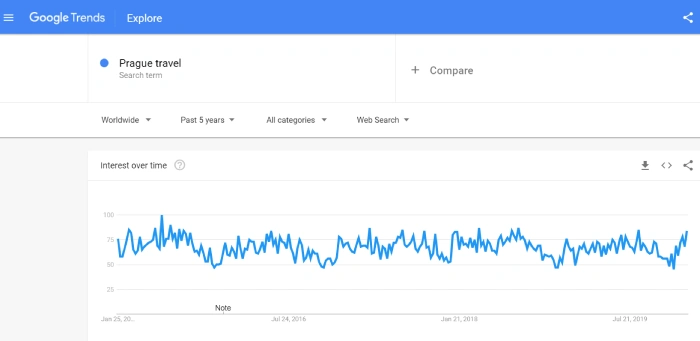
It is also very useful to compare a number of keywords and track trends in demand for more different words or different destinations. We will add to Prague some competitive, similar destinations:
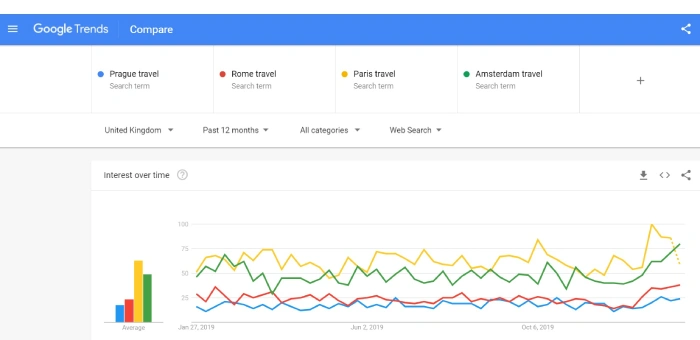
We can see that Paris has the highest demand on the UK market but it started falling while the demand for Amsterdam is significantly rising.
4. Facebook search
Using a Facebook search feature can also be important for our travel market research.
We need to start with a basic search. This means that we will enter the same keywords as on Google:
- Prague trip
- Prague travel deals
- Prague trips
- Prague arrangement
- Prague travel package
Here are some of the results:
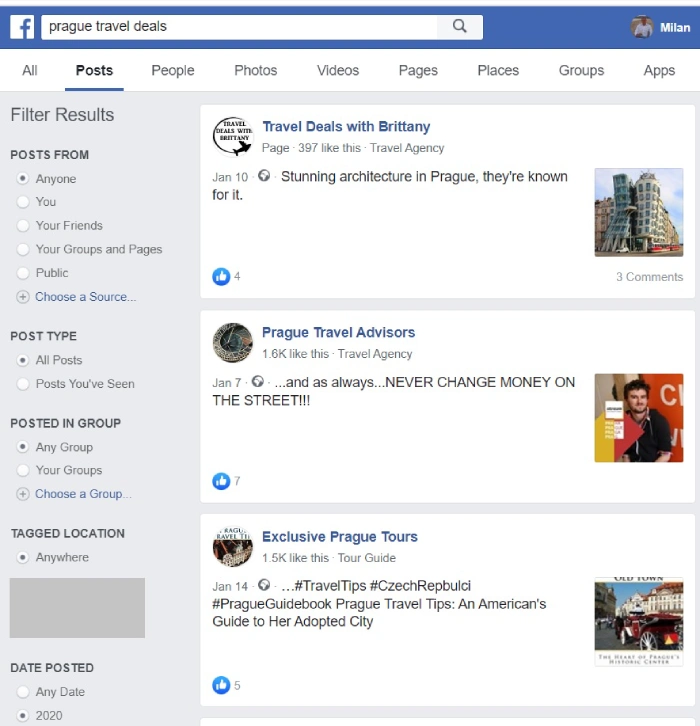
In these examples, we can see which tour operators and travel agents offer Travel deals for Prague, what are their prices, how they use Facebook to promote these tours, how much they differ from our offer, and so on.
All of this is important information that will help us to better configure our own travel package, reduce or increase the price, get new marketing ideas, etc.
5. Twitter search
We can use Twitter to track both – the offer and the demand for a particular destination.
Simply enter all search terms as in previous cases and follow who is offering and who is looking for travel deals, and what is written about Prague as a destination.
Here’s a part of the results for the search term “Prague travel deals”:
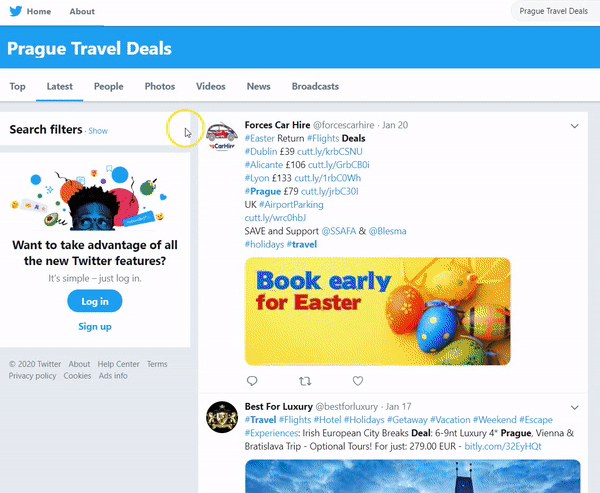
The search results on Twitter give you the ability to start some actions besides getting an insight into the offer and demand.
In this example below, we can see that on Twitter you can also offer and sell your services while doing a tourism market research.
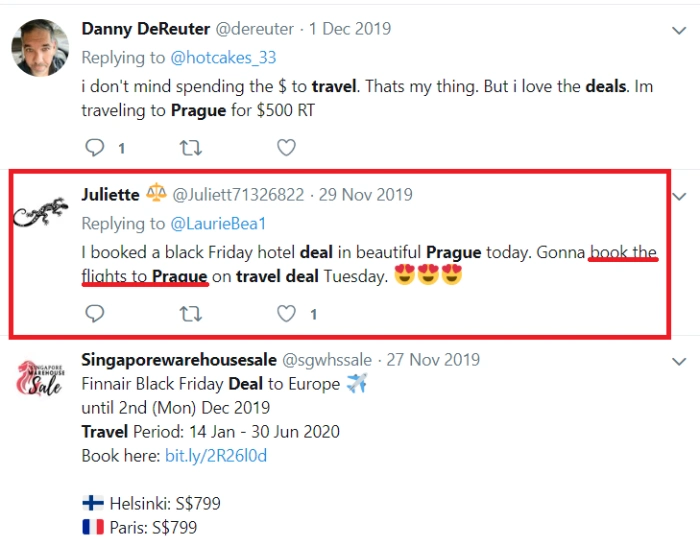
Juliette’s tweet (the second on the list) is a very common example when people are publicly seeking for travel deals and services or “reveal to us” that they want to travel to some destination. So, if you sell airline tickets here is a chance to immediately react: Fave her tweet and then send a reply with useful info about flights and rates you have for her.
Small Bonus Advice: When replying to Twitter, put the dot as the first symbol in the tweet, to which you reply. This way, your tweet will be visible to all your followers and other users while otherwise the tweet will remain visible only in the mutual communication between you and the users to whose tweets you respond. Use this only when you want (and you think it’s appropriate and important) other Twitter users to see your reply, and not just the person you are responding to.
6. Instagram Research
We can also use Instagram search feature and check hashtags, locations and accounts that can be important.
If we run a hotel or a restaurant or some other location based travel business we need to search hashtags relevant to our destination and check out the locations in our destination and maybe in other similar and competitive destinations.
This way we can learn what our competitors are offering, how they promote their services on Instagram, what travelers are posting and what do they like and don’t like – based on their captions, comments, likes.
We can find out what is a hot topic at the moment and a cool thing to implement in our offer and also learn many other things depending on our needs.
Stalking can get really professional, just think about how you can use it. 😉
As for our travel deal example we can search for a relevant hashtags, like #PragueTravel and see what competitors are doing and how they do it, what are their follower reactions, etc.
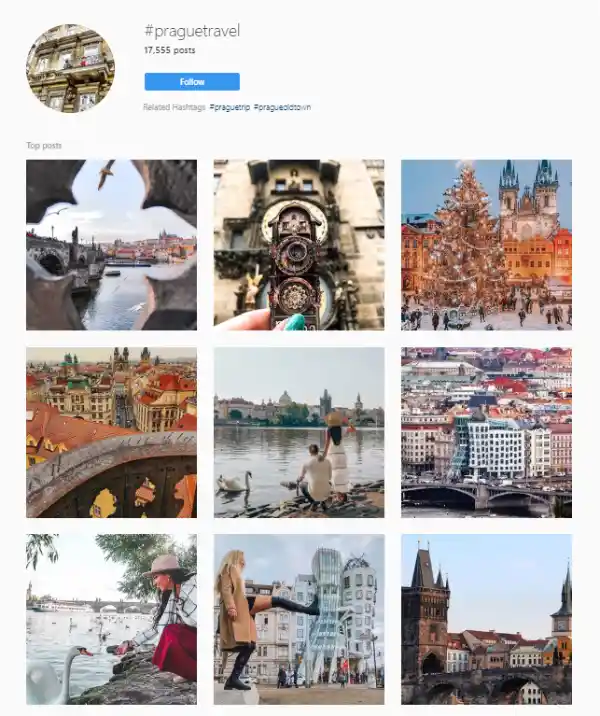
BONUS TRICK – Find your primary competitors on Instagram and go through their followers. You can like their posts and follow them. They are your perfect target group and you want to get noticed!
Read more on how to use Instagram to get more direct bookings.
7. YouTube
We can use YouTube to see how many competitors are using this channel, what kind of videos they are creating and how hard would it be for us to enter the game.
If we can find just a lousy non-quality videos then we have a chance to create great content and dominate the YouTube search, which has the second largest search volume in the world, just after the Google.
Most of travelers go to YouTube to look for a travel destination videos and a particular hotel videos.
We can make different videos for each stage of a digital travel cycle – Inspirational destination video for a dreaming phase, FAQ video for an interest phase, and the happy guests reviews for a consideration phase.
You can also use other social networks (like Pinterest), various websites and comments, forums, and the like to explore the tourist market.
It is important to collect updated and fresh information about supply and demand, analyze this data well and take the appropriate action.
What methods do you use to learn more about your travel market?
